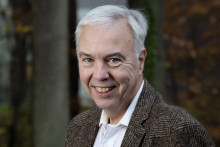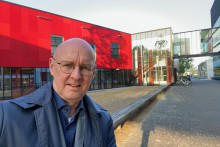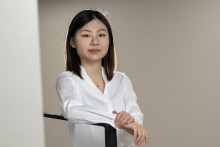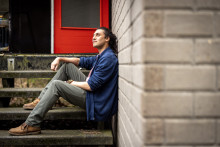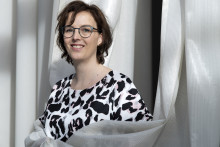‘The main mission behind this position is to make the UT’s work on energy coherent and more visible,’ Keurentjes says about his role. ‘There is a large number of projects and people doing things related to energy and energy transition. Nevertheless, the research is scattered, which hampers the visibility of the UT as a university with a strong footprint in this field.’
jos keurentjes
1986 MSc (cum laude) in Environmental Sciences, Wageningen University
1991 PhD (cum laude) in Food- and Bioengineering Wageningen University
1991-1997 AkzoNobel Central Research
1997-now Full professor of Process and Equipment Design, Eindhoven University of Technology
2007-2012 Executive Vice President AkzoNobel Industrial Chemicals
2012-2014 AkzoNobel Corporate Director Technology and Open Innovation
2014-2019 Chief Scientific Officer and member of the Executive Board of TNO (Netherlands Organisation for Applied Research)
Jos Keurentjes himself has a lot of experience in research, as well as the industry, having worked for TNO, AkzoNobel and as a full professor at the Eindhoven University. ‘I’ve seen a bit of all and can bring a diverse network to the table,’ says the Programme Director. ‘I’ve never been the guy to work nine to five. I want to be involved in large societal transitions – which energy surely is. And with my degree in environmental sciences, this position feels a bit like returning to where I started.’
Unlocking the knowledge
The position comes with a four year term. Within this time, Keurentjes wants to achieve two main goals. Firstly, to create a clear entry point for external parties with energy related inquiries. ‘Energy issues are very broad and complex,’ he says. ‘They cannot be answered by one professor or one group, but they can be answered by the UT. We need to unlock all the knowledge available at this university. People should be able to come here with any question and we’ll provide them with one clear and complete answer. Moreover, the need for skilled people in this domain will be incredible, so we also need to develop challenge-based learning programs on various levels.’
Research centers
Secondly, Keurentjes would like to ‘create a few visible research centers that make the UT world famous’, he says. ‘I’d like to open up centers where we combine research of different disciplines, as well as involve external partners. I believe these should be physical centers with a yearly turnover of about 30 – 50 million euros. We need to think large to create visibility.’
As the professor only started at the position a few weeks ago, the details of the energy innovation programme and the aforementioned research centers are yet to be determined. However, Keurentjes knows one thing for certain: ‘I want us to work on topics that can create significant mass and that help us to distinguish ourselves.’

Pieces of the puzzle
‘There are a few topics I think we could focus on,’ he continues. ‘For instance, battery storage is something nobody else in the Netherlands is working on. Further, there is a lot of knowledge on sensors and the ICT part of distributed energy systems. What also popped into my head is: relatively a lot of the world’s energy is currently used for cooling of data centers. That is literally a waste. The UT has a lot of skills and expertise that have the potential to make a difference there. But again – the topics and the programme still need to be defined.’
‘I’m here to serve, not to manage’
Jos Keurentjes keeps stressing the complexity of energy transition. ‘It has so many components: technologies like solar, hydrogen, storage, ICT, materials, circularity… it is all connected. Moreover, a unique feature of the UT is the inclusion of ethical and societal aspects to ensure that our innovations can land in society. We will not solve the energy transition ourselves, but we can provide unique pieces of the puzzle.’ Regarding his wishes for the coming years, he adds: ‘I hope we can make something really worthwhile together. I would like to let the UT and the people shine. I’m here to serve, not to manage.’


